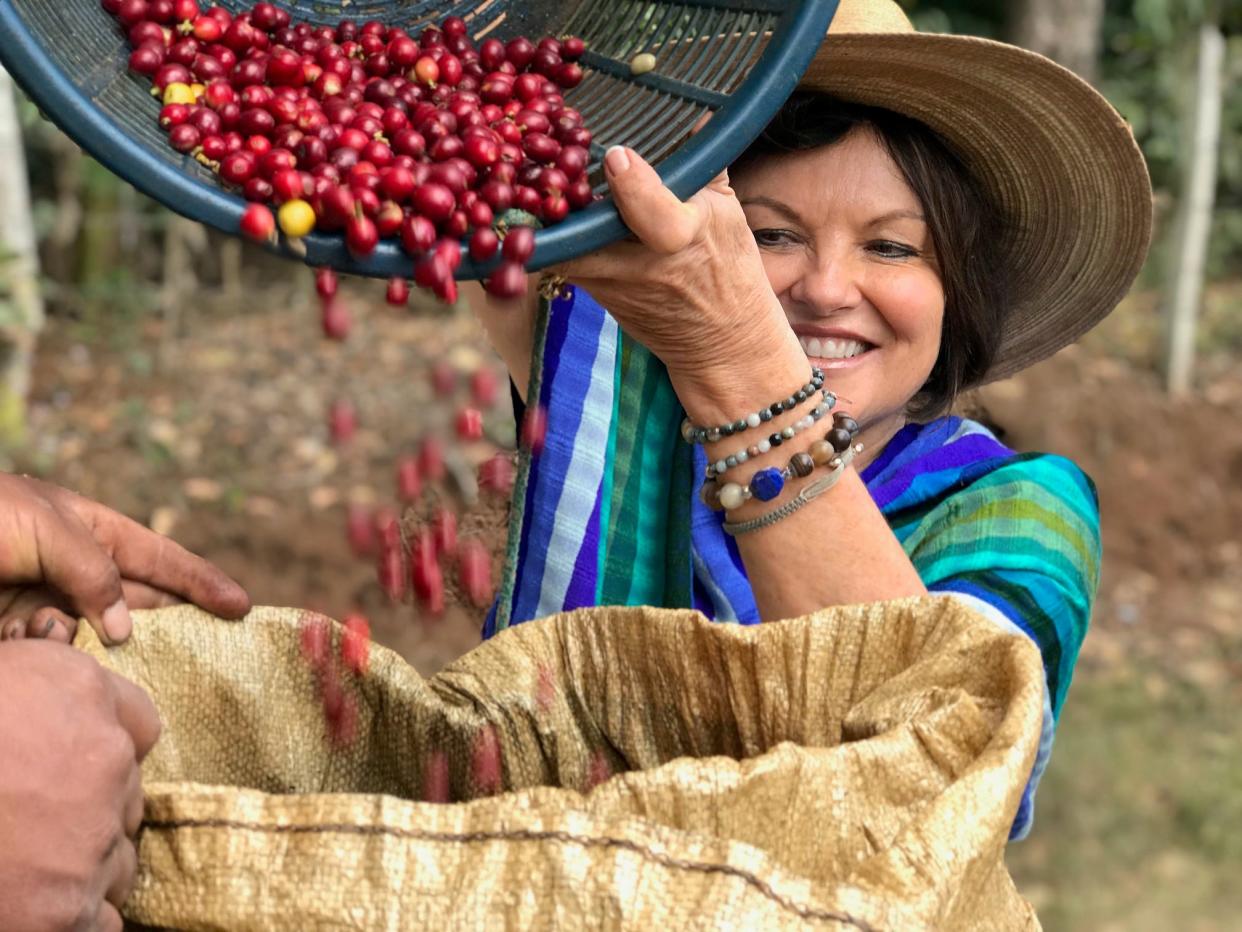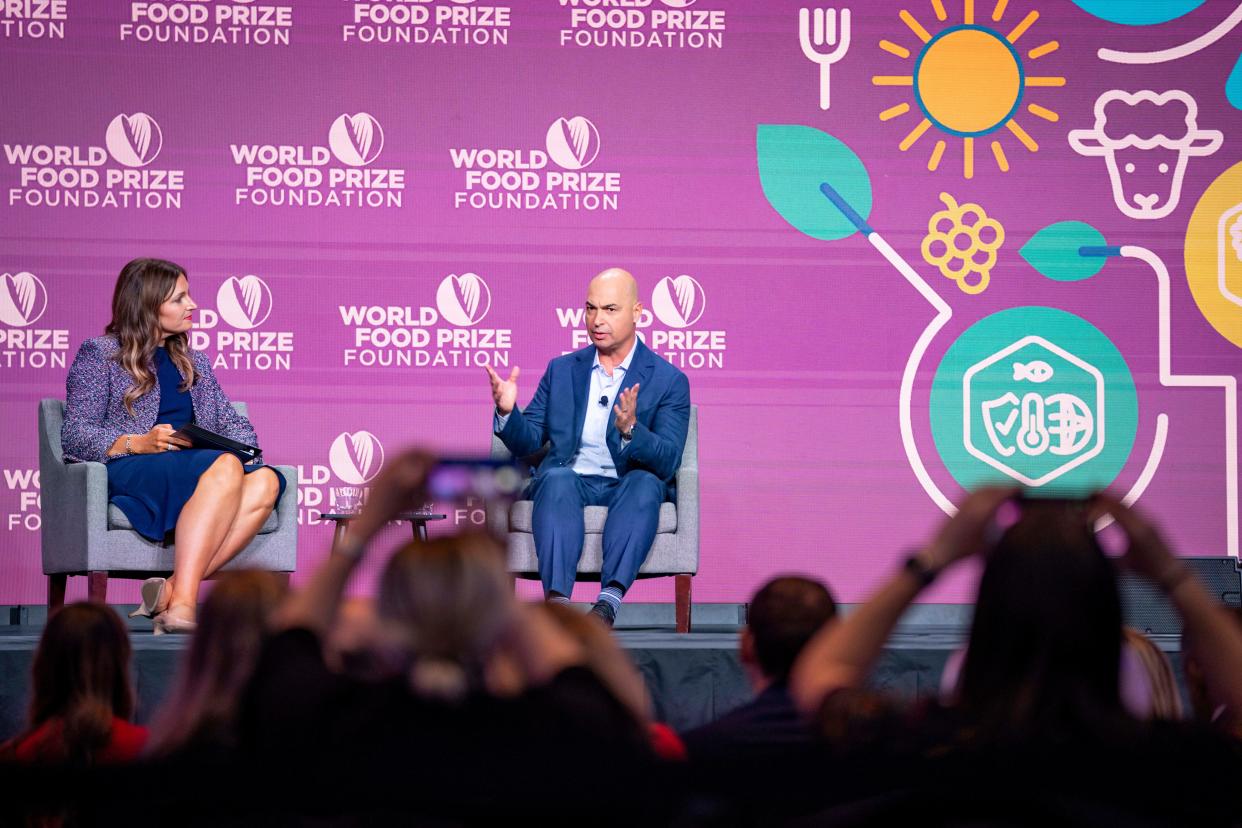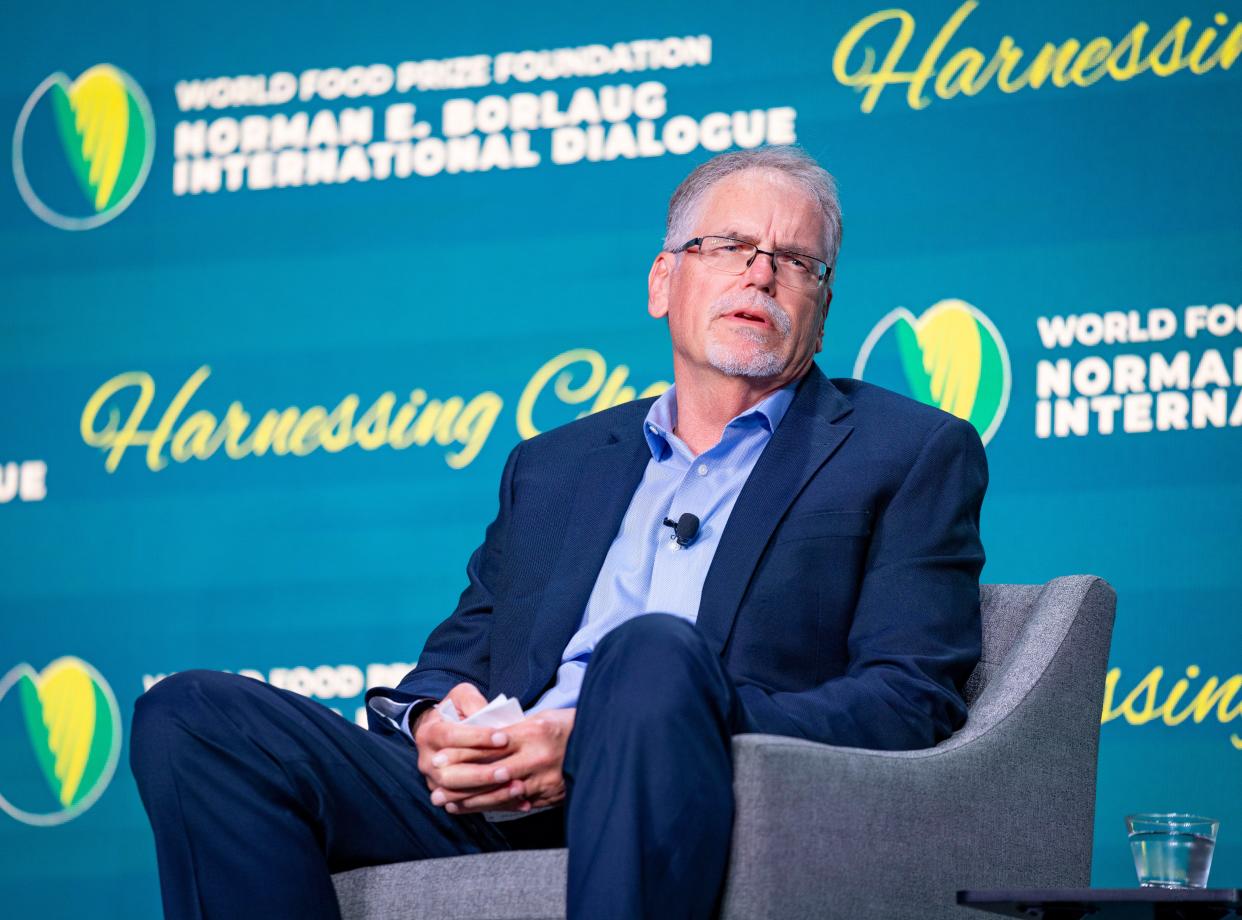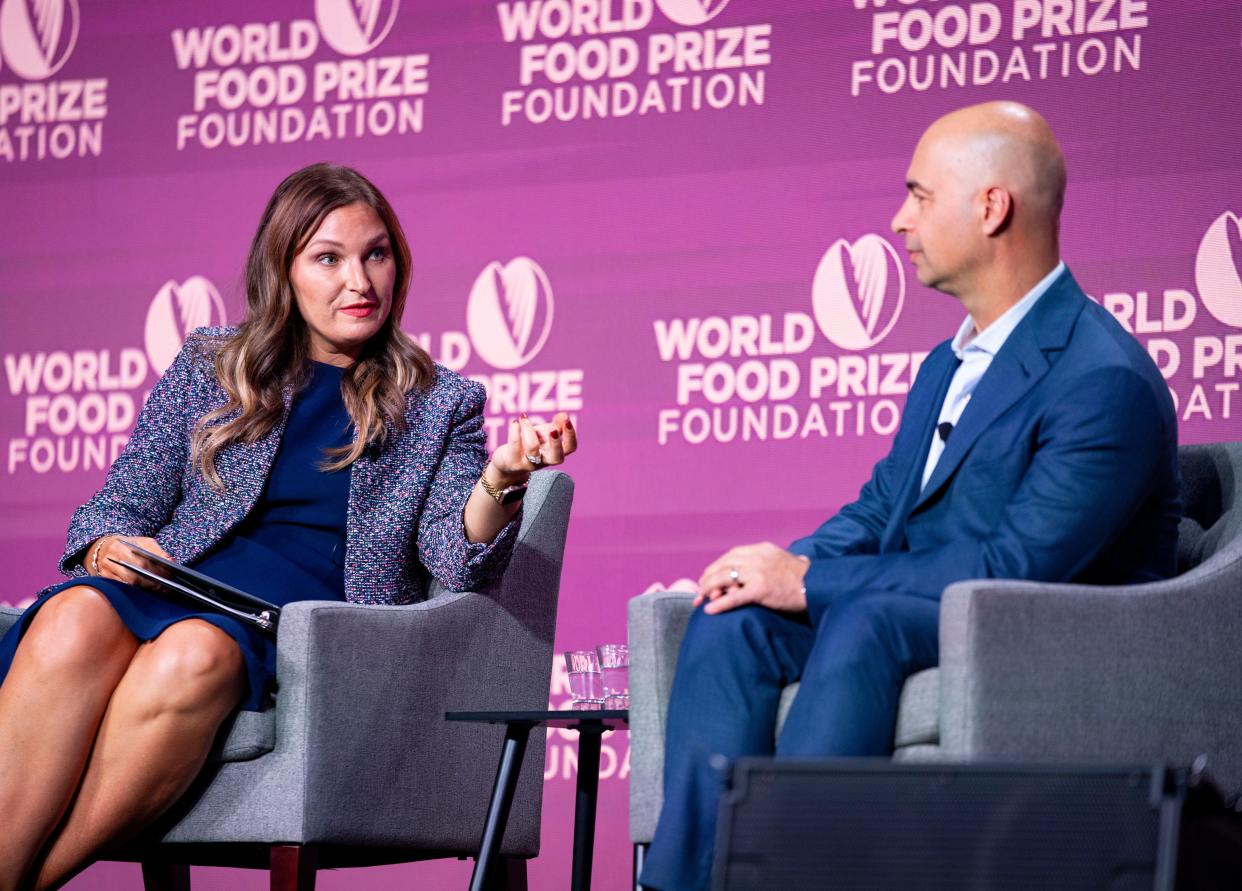U.S. ag companies invest billions so crops can better withstand extreme weather

Large U.S. agricultural companies say they're investing billions of dollars annually to develop products that will help farmers maintain good yields while facing damaging drought, wind, pests and other threats tied to the changing climate.
Participating in the World Food Prize Borlaug Dialogues, Chuck Magro, Corteva Agroscience's CEO, said the company is spending $1.5 billion annually on research and development, in part to help to farmers be more resilient in the face of extreme weather challenges.
"That's about $4 million a day in developing new technology, and that's where I get excited," said Magro, who spoke at the Iowa Events Center as part of the Oct. 24-26 gathering. It culminated in Thursday's presentation of the 2023 World Food Prize at the Iowa Capitol to Heidi Kühn of California for helping farmers in former battlegrounds including Afghanistan and Vietnam grow fruit, nuts and other crops in fields once filled with landmines.
Magro said part of Corteva's investment is taking place in Johnston, the home of the company's Pioneer seed business. Statewide, Corteva employs about 3,000 people, he said.

"There are some worrying trends globally around food security," he said. "I'm no expert in climate change, but we're starting to see insect and disease pressure migrate to parts of the world that we haven't seen before."
He cited locust swarms in Africa and Asia two years ago that spanned about 100 square miles. In Kenya, one swarm was "25 miles by 37 miles wide," he said. "Locust are normal for that part of the world, but not that size."
Previously: Former Iowa Gov., U.S. Ambassador Terry Branstad named World Food Prize president
The reason for the massive swarms was extreme moisture followed by extreme heat, he said.
At the same time, Europe is struggling with bacteria that's destroying millions of olive trees. And in the U.S., a fungus caused by insect disease is affecting citrus production. In Florida, "the forecast is for the crop to be one of the worst since the 1930s," Magro said.
More: Derechos, rare haboob in Iowa raise concerns: Is the Midwest headed to another Dust Bowl?
The United Nation's Food and Agriculture Organization says plant diseases annually cost the global economy around $220 billion, and invasive insects, around $70 billion.
Here's what Corteva, Bayer and other leading agriculture industry leaders represented in the annual Des Moines gathering, named for World Food Prize founder Norman Borlaug, had to say about climate change and their effort to help agriculture withstand its effects.
Bayer, Stine working on more climate-resilient short-stature corn

Bayer AG, which finalized a merger with Monsanto in 2018, is investing about $2.6 billion, work that includes developing about 500 new seed hybrids each year, said Jacqueline Applegate, president of Bayer's St. Louis-based North America Crop Science.
"The volatility of weather is more dramatic than ever," said Applegate, but the company's seed breeding and crop protection developments are giving farmers "greater stability in yields and overall health."
One of the products Bayer will introduce is a short-stature corn that performed well in the 2020 derecho that swept across Iowa and other states with winds up to 140 mph, leaving behind fields of flattened corn and soybeans.
Bayer and Stine Seed Co., an Adel company owned by Iowa billionaire Harry Stine that specializes in short-stature corn, both said their crops withstood the hurricane-level winds better than tall corn in neighboring fields.
Applegate said the short-stemmed plant's bigger root mass helps it survive strong winds as well as drought. And it's yielding over 300 bushels per acre on some of the 30,000 acres in Iowa and other states where it's being tested, she said.

Bayer also is studying how much the larger root system can contribute to the sequestration of carbon, Applegate said. Plants can store carbon dioxide in the soil, preventing the greenhouse gas from contributing to climate change.
How are companies turning a weed into cash?

Bayer, Bunge Ltd. and Chevron Corp. are developing CoverCress, the commercial name for a kind of pennycress that can be seeded on fields in the fall to protect soil over winter and be harvested in late spring, potentially generating a third cash crop for farmers.
"Pennycress is a weed ... that normally we're trying to kill," said Jennifer Ozimkiewicz, vice president of Bayer's global corn and soybean crop strategy. But "we had really brilliant scientists and breeders 10 years ago that took this ordinary weed and turned it into a cash cover crop."
In coming years, the pennycress may be used to help make low-carbon biodiesel fuel, said Ozimkiewicz, who was part of a World Food Prize panel discussing competition between food and fuel producers for crops.
Especially during times of drought, some livestock producers and bakers' groups have complained that demand for corn and soybeans to make ethanol, biodiesel and other renewable fuels has strained supplies and significantly increased prices. Iowa is the nation's leading producer of ethanol and biodiesel, as well as corn.
Twenty years ago, when ethanol and biodiesel production began, "It was clearly fuel versus food, but that narrative has changed," said Kevin Lucke, president of the Chevron Renewable Energy Group in Ames. Chevron purchased Renewable Energy Group last year.
"Now agriculture is really providing both for the U.S. and world," Lucke said.
Production of ethanol, for example, yields as a byproduct a high-protein livestock feed called dried distillers grain and oil that can be used to make biodiesel and other products.
Increased corn and soybean yields and new crops like pennycress are helping to meet demand for low-carbon fuels, Lucke said. "Innovation is really the answer," he said.
When will Iowa famers begin growing CoverCress?
Lucke, who farms 1,300 acres in western Iowa near Harlan, said pennycress probably won't be a viable cash crop for farmers north of Interstate 80 because the region's growing season isn't long enough, but it could be feasible in southern Iowa.
"It will be harvested in the middle of May to early June," Lucke said, after which farmers can grow a short-season corn or soybean crop.
A processing plant in Louisiana will be expanded so it can crush pennycress and winter canola by 2026-27, he said. In addition to being used to make renewable fuel, the crop also can provide high-protein meal for animals.
Farmers are encouraged to plant a cover crop in the fall to prevent soil erosion and the loss of nitrogen and fertilizer that degrades water quality. At the same time, cover crops help build soil health.
Using diplomacy to tackle America's thorniest trade issues
Ramin Toloui, U.S. assistant secretary of state for economic and business affairs, said the Biden administration has gained access to India to sell pork; expanded U.S. beef exports to Japan; and is in discussions about an Indo-Pacific economic trade agreement that could open doors for U.S. farm goods in fast-growing markets that include the Philippines, Singapore and Malaysia.

Toloui said the U.S. Department of Agriculture and State Department also are working to stop Mexico's plan, announced in 2020, to ban genetically modified corn. The U.S. Department of Agriculture says about 91% of the corn grown in the U.S. is genetically engineered for traits that help improve yields, like reducing insect damage and better drought tolerance.
"It's important to the well-being not only of Americans and American farmers, but also Mexicans who are benefitting from these crops," he said.
Mexico is the largest buyer of U.S. corn. And Iowa is the nation's largest corn producer, expected to account for about 2.5 billion bushels of the nation's 15.1 billion bushels this year.
Toloui, a native Iowan, said the U.S. has launched a dispute settlement as outlined under the U.S.-Mexico-Canada Agreement.
"We're trying address this issue diplomatically, and using the tools and recourse we have under our trade agreements," he said.
Donnelle Eller covers agriculture, the environment and energy for the Register. Reach her at deller@registermedia.com or 515-284-8457.
This article originally appeared on Des Moines Register: Ag companies invest to improve crops' weather endurance
